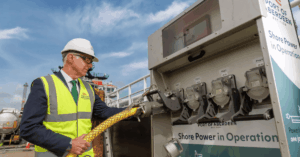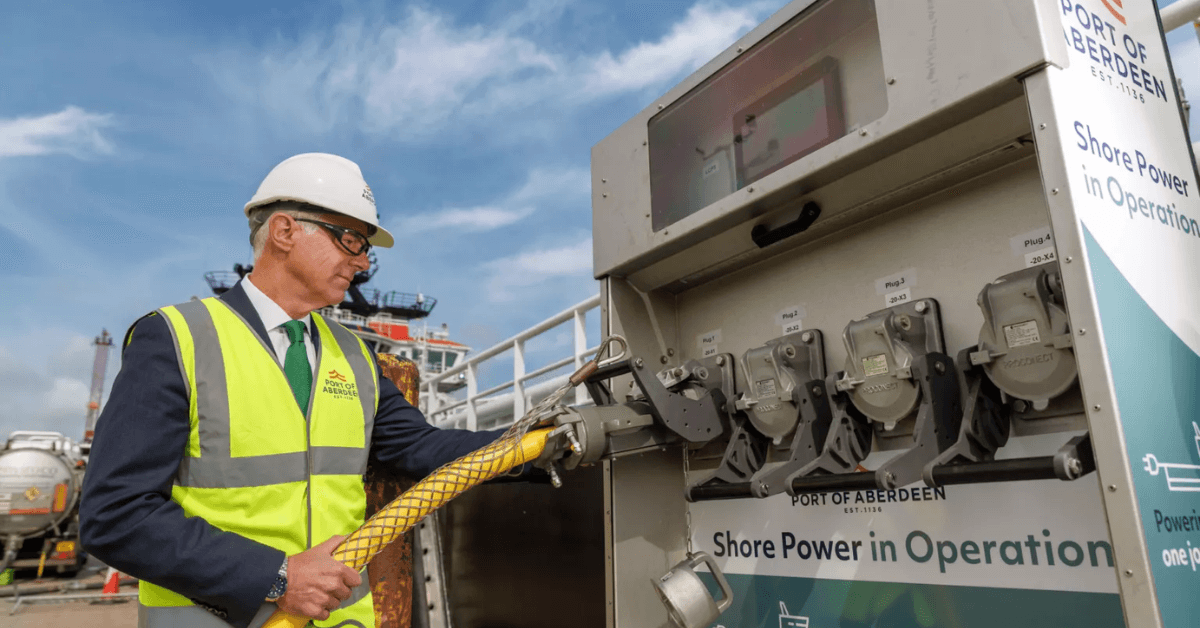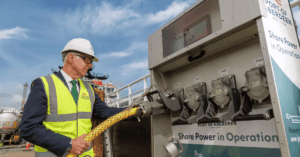
In A First, Australia Sanctions 60 Russian Shadow Fleet Vessels
June 20, 2025
India Plans To Cut Fuel Exports, Reroute Oil Imports If Strait of Hormuz Is Blocked
June 20, 2025

Port of Aberdeen has launched Scotland’s largest maritime decarbonisation project by switching on shore power at eight berths in its North Harbour.
This new system allows vessels to connect directly to electricity from renewable sources instead of running their diesel-powered auxiliary engines while at berth. The goal is to reduce carbon emissions, air pollution, fuel use, and noise.
Port of Aberdeen is a Trust Port with a clear goal to become the UK’s first net-zero port by 2040. The project, named ‘Shore Power in Operation’, is supported by the UK Government’s Zero Emissions Vessels and Infrastructure (ZEVI) programme. It represents a £4 million investment from both the public and private sectors.
The shore power system was installed by PowerCon, a market leader in shore power technology. According to the data shared, this new infrastructure could reduce up to 60,000 tonnes of CO₂ equivalent emissions over the next 20 years. That’s like removing about 2,140 cars from the roads every year.
The first ship to use the new shore power system was NS Iona, operated by OSM Thome. It is one of five vessels that were upgraded to support shore power under this project.
The shore power at these eight berths is just the start. The port has also installed infrastructure for two berths at Regent Quay to support Bibby Marine’s electric Service Operation Vessel, which is also part of the ZEVI programme.
Additionally, the port is close to completing shore power infrastructure for Serco NorthLink’s passenger ferries, with funding from Caledonian Maritime Assets Limited.
Port of Aberdeen’s CEO described the new system as a game-changing project for both the port and its customers. Ships that use this system could reduce their carbon emissions by up to 80% while docked.
He added that the port is not only helping the energy transition in the North Sea but also showing leadership by investing in a cleaner and greener future that benefits the environment, the local community, and port users.
This project is part of the Department for Transport’s ZEVI competition, which was announced in February 2023 and is managed in partnership with Innovate UK. Through ZEVI, the UK Government has committed over £80 million to ten key projects across the country.
These projects involve 52 organisations and aim to test clean maritime technologies in real-world conditions, from the Orkney Islands to southwest England.
The port led an industry and academic consortium that included Connected Places Catapult, OSM Offshore, Tidewater Marine UK Ltd, and the University of Manchester’s Tyndall Centre. They also received support from engineering firms Buro Happold and Energy Systems Catapult.
A shore power expert from PowerCon said that ship emissions while docked are a major environmental and public health issue, causing 46% of greenhouse gases from domestic shipping.
He explained that shore power can completely remove these emissions, and that while the technology is already used widely in other countries, the UK has been slow to catch up. He praised the Port of Aberdeen for leading the way.
Port of Aberdeen also plans to expand shore power across more berths along its 7,600-metre quayside.
Reference: portofaberdeen
Source: Maritime Shipping News


